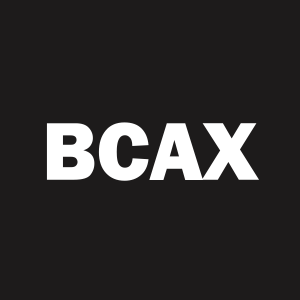Bicara Therapeutics Highlights Broad Potential of Ficerafusp Alfa at AACR Annual Meeting 2025
Rhea-AI Summary
Bicara Therapeutics presented multiple datasets for their lead drug ficerafusp alfa at the AACR Annual Meeting 2025. The drug is a first-in-class bifunctional antibody targeting EGFR and TGF-β across various solid tumors.
Key highlights:
- In head and neck cancer trials, the drug showed effectiveness in blocking TGF-β signaling and preventing drug resistance
- For skin cancer patients, the drug achieved a 30.4% overall response rate and 82.6% clinical benefit rate in previously treated patients
- Median progression-free survival reached 7.0 months in skin cancer patients
- Common side effects included skin-related issues and fatigue
The company also presented promising preclinical data showing ficerafusp alfa's potential to overcome resistance to KRAS-G12C inhibitors in lung cancer treatment. These results support the drug's broad therapeutic potential across multiple solid tumor types, particularly in combination with other cancer therapies.
Positive
- 30.4% overall response rate (7/23 patients) in Phase 1/1b trial for cutaneous squamous cell carcinoma
- 82.6% clinical benefit rate (19/23 patients) showing strong efficacy in cSCC treatment
- 7.0 months median progression-free survival in cSCC, improving upon historical treatments
- Promising preclinical data showing effectiveness against KRAS G12C inhibitor resistance in lung cancer
- Positive biomarker data showing effective TGF-β signaling blockade in head and neck cancer trial
Negative
- [
- "
- 7
- 0
- %
- o
- f
- e
- n
- r
- o
- l
- l
- e
- d
- p
- a
- t
- i
- e
- n
- t
- s
- (
- 1
- 6
- /
- 2
- 3
- )
- h
- a
- d
- p
- r
- o
- g
- r
- e
- s
- s
- i
- v
- e
- d
- i
- s
- e
- a
- s
- e
- a
- s
- b
- e
- s
- t
- r
- e
- s
- p
- o
- n
- s
- e
- t
- o
- p
- r
- i
- o
- r
- t
- h
- e
- r
- a
- p
- y
- "
- ,
- "
- S
- i
- g
- n
- i
- f
- i
- c
- a
- n
- t
- a
- d
- v
- e
- r
- s
- e
- e
- v
- e
- n
- t
- s
- r
- e
- p
- o
- r
- t
- e
- d
- :
- 7
- 4
- %
- o
- f
- p
- a
- t
- i
- e
- n
- t
- s
- e
- x
- p
- e
- r
- i
- e
- n
- c
- e
- d
- d
- e
- r
- m
- a
- t
- i
- t
- i
- s
- a
- c
- n
- e
- i
- f
- o
- r
- m
- "
- ,
- "
- L
- i
- m
- i
- t
- e
- d
- 1
- 2
- -
- m
- o
- n
- t
- h
- p
- r
- o
- g
- r
- e
- s
- s
- i
- o
- n
- -
- f
- r
- e
- e
- s
- u
- r
- v
- i
- v
- a
- l
- r
- a
- t
- e
- o
- f
- 2
- 5
- .
- 4
- %
- i
- n
- c
- S
- C
- C
- t
- r
- i
- a
- l
- "
- ,
- "
- M
- u
- l
- t
- i
- p
- l
- e
- t
- r
- e
- a
- t
- m
- e
- n
- t
- -
- r
- e
- l
- a
- t
- e
- d
- s
- i
- d
- e
- e
- f
- f
- e
- c
- t
- s
- i
- n
- c
- l
- u
- d
- i
- n
- g
- e
- p
- i
- s
- t
- a
- x
- i
- s
- (
- 3
- 0
- %
- )
- ,
- d
- r
- y
- s
- k
- i
- n
- (
- 3
- 0
- %
- )
- ,
- a
- n
- d
- f
- a
- t
- i
- g
- u
- e
- (
- 3
- 0
- %
- )
- "
- ]
- <
- /
- i
- n
- v
- o
- k
- e
- >
News Market Reaction
On the day this news was published, BCAX gained 0.47%, reflecting a mild positive market reaction.
Data tracked by StockTitan Argus on the day of publication.
BOSTON, April 28, 2025 (GLOBE NEWSWIRE) -- Bicara Therapeutics Inc. (Nasdaq: BCAX), a clinical-stage biopharmaceutical company committed to bringing transformative bifunctional therapies to patients with solid tumors, today announced multiple presentations related to ficerafusp alfa at the American Association for Cancer Research (AACR) Annual Meeting 2025. Ficerafusp alfa is a first-in-class bifunctional antibody that combines two clinically validated targets: an epidermal growth factor receptor (EGFR) directed monoclonal antibody with a domain that binds to human transforming growth factor beta (TGF-β) and is being evaluated across multiple solid tumor types.
“We are excited to present several datasets at AACR this year that underscore the broad therapeutic potential of ficerafusp alfa,” said David Raben, MD, Chief Medical Officer of Bicara Therapeutics. “This includes new translational data that further support the ability of ficerafusp alfa to effectively block TGF-β signaling in the tumor microenvironment and underscore its potential to prevent resistance mechanisms and prolong therapeutic durability in HPV-negative recurrent/metastatic head and neck squamous cell carcinoma. We are also pleased to share encouraging clinical data from our Phase 1/1b dose expansion cohort in second line metastatic or advanced cutaneous squamous cell carcinoma, where we’re excited by the potential to continue to investigate ficerafusp alfa as a monotherapy as well as in combination with immunotherapy in the front-line setting. Additionally, we are sharing new preclinical data that offer insights into how TGF-β inhibition may help overcome acquired resistance to KRAS G12C inhibitors in KRAS G12C-mutant lung cancer, an important area of unmet need for patients with these types of RAS mutations. We look forward to advancing ficerafusp alfa and believe it has the potential to provide meaningful and durable clinical benefit across multiple solid tumor types where there is a strong biologic rationale for the dual inhibition of both EGFR and TGF-β.”
Dual blockade of EGFR and TGF-β with ficerafusp alfa has the potential to overcome resistance mechanisms in 1L R/M HNSCC in combination with pembrolizumab
Presentation Highlights:
- Preliminary findings from a translational medicine biomarker dataset from Bicara’s ongoing Phase 1/1b trial of ficerafusp alfa in 1L (first line) recurrent/metastatic (R/M) head and neck squamous cell carcinoma (HNSCC) demonstrate that ficerafusp alfa effectively blocks TGF-β signaling in the tumor and prevents key mechanisms associated with drug resistance.
- Spatial transcriptomics revealed downregulation of epithelial-mesenchymal transition and hypoxia pathways in human papillomavirus (HPV)-negative tumors with ficerafusp alfa and pembrolizumab, supporting the potential role of TGF-β inhibition in preventing the mesenchymal phenotype associated with EGFR-targeted resistance, with complementary clinical data highlighting enhanced durability in HPV-negative R/M HNSCC to be presented at the 2025 American Society of Clinical Oncology Annual Meeting.
- These data further support the synergistic effects of targeting TGF-β, EGFR, and PD-1 in the tumor microenvironment, and to combine ficerafusp alfa with pembrolizumab in HPV-negative R/M HNSCC.
Dose expansion results of single agent ficerafusp alfa (BCA101), a bifunctional EGFR/TGF-β inhibitor in patients with metastatic or advanced cutaneous squamous cell carcinoma (cSCC)
Presentation Highlights:
- As of the data cut-off date of March 20, 2025, the single-arm, multicenter dose expansion cohort from an ongoing Phase 1/1b trial evaluating ficerafusp alfa monotherapy enrolled 23 patients with 2L+ metastatic or advanced cutaneous squamous cell carcinoma (cSCC) who had received (or been intolerant to or ineligible for) prior anti–PD-1 therapy.
70% of patients (16/23 patients) had progressive disease as best response to prior anti–PD-1 therapy. - The overall response rate (ORR) was
30.4% (7/23 patients) and the clinical benefit rate (complete response, partial response, and stable disease lasting for ≥5 weeks) was82.6% (19/23 patients). - Median progression-free survival (mPFS) was 7.0 months (
95% CI, 2.7-8.9 months), and the PFS rate at 12 months was25.4% , demonstrating improvements over historical treatment in cSCC. - Tolerable safety profile with the most common treatment-related adverse events of any grade including dermatitis acneiform (17/23 patients;
74% ), epistaxis (7/23 patients;30% ), dry skin (7/23 patients;30% ), and fatigue (7/23 patients;30% ).
“Cutaneous squamous cell carcinoma is the second most common skin cancer, and its rising incidence underscores the growing need for effective treatment options,” said Deborah Wong, MD, PhD, Director of the Head and Neck Medical Oncology Program at the University of California, Los Angeles. “While anti–PD-1 therapies have brought significant advances for patients with advanced or metastatic disease, there remains a critical gap for those whose disease progresses or is refractory to these therapies, with no approved second-line options. The ficerafusp alfa monotherapy data are encouraging, demonstrating responses that appear to improve upon historical benchmarks in this setting.”
Ficerafusp alfa reverses acquired resistance to the KRAS-G12C inhibitor sotorasib in KRAS-G12C-mutated lung tumors
Presentation Highlights:
- In in vitro and in vivo preclinical studies, ficerafusp alfa + a KRAS-G12C inhibitor (G12Ci) was shown to be more effective than G12Ci alone, with G12Ci-resistant lung cancer cells remaining susceptible to this combination.
- This presentation supports the hypothesis that TGF-β inhibition by ficerafusp alfa helps reverse G12Ci resistance and highlights the potential of combining G12Ci with ficerafusp alfa in drug-resistant KRAS-G12C-mutated cancers, including lung cancer.
Following the meeting, the poster presentations will be available on the Bicara website under the Presentations & Publications section.
About Cutaneous Squamous Cell Carcinoma
Cutaneous squamous cell carcinoma (cSCC) is the second most prevalent skin tumor, with an increasing incidence attributed to multiple factors, including exposure to ultraviolet light, genetic predisposition, and environmental elements. For patients whose disease progresses on anti–PD-1 therapy or is refractory to anti–PD-1 therapy, there is no approved second-line therapy. cSCC is estimated to result in up to 8,800 deaths annually in the U.S. alone.
About Ficerafusp Alfa
Ficerafusp alfa is a first-in-class bifunctional antibody that combines two clinically validated targets: an epidermal growth factor receptor (EGFR) directed monoclonal antibody with a domain that binds to human transforming growth factor beta (TGF-β). Through this dual-targeting mechanism, ficerafusp alfa has the potential to exert potent anti-tumor activity by simultaneously blocking both cancer cell-intrinsic EGFR survival and proliferation, as well as the immunosuppressive TGF-b signaling within the tumor microenvironment.
Ficerafusp alfa is currently being evaluated in FORTIFI-HN01, a pivotal Phase 2/3 clinical trial 1L (first line) recurrent/metastatic (R/M) head and neck squamous cell carcinoma (HNSCC).
About Bicara Therapeutics
Bicara Therapeutics is a clinical-stage biopharmaceutical company committed to bringing transformative bifunctional therapies to patients with solid tumors. Bicara’s lead program, ficerafusp alfa, is a bifunctional antibody that combines two clinically validated targets, an epidermal growth factor receptor (EGFR) directed monoclonal antibody with a domain that binds to human transforming growth factor beta (TGF-β). Through this dual-targeting mechanism, ficerafusp alfa has the potential to exert potent anti-tumor activity by simultaneously blocking both cancer cell-intrinsic EGFR survival and proliferation, as well as the immunosuppressive TGF-β signaling within the tumor microenvironment. Ficerafusp alfa is being developed in head and neck squamous cell carcinoma, where there remains a significant unmet need, as well as other solid tumor types. For more information, please visit www.bicara.com or follow us on LinkedIn or X.
Forward-Looking Statements
This press release contains forward-looking statements within the meaning of the Private Securities Litigation Reform Act of 1995, as amended, including, without limitation, implied and express statements regarding Bicara’s preclinical studies and presentation of results, the clinical development of ficerafusp alfa and presentation of data from a Phase 1/1b dose expansion cohort of ficerafusp alfa monotherapy in second line or later cSCC, the clinical development of ficerafusp alfa in combination with pembrolizumab, and the expected therapeutic potential and clinical benefits of ficerafusp alfa, including potential efficacy and tolerability. The words “may,” “might,” “will,” “could,” “would,” “should,” “plan,” “anticipate,” “intend,” “believe,” “expect,” “estimate,” “seek,” “predict,” “future,” “project,” “potential,” “continue,” “target” and similar words or expressions, or the negative thereof, are intended to identify forward-looking statements, although not all forward-looking statements contain these identifying words. Any forward-looking statements in this press release are based on management's current expectations and beliefs and are subject to a number of risks and uncertainties that are difficult to predict. Factors that could cause actual results to differ include, but are not limited to, risks and uncertainties related to uncertainties inherent in the development of product candidates, including the conduct of research activities and the conduct and enrollment of clinical trials; uncertainties as to the availability and timing of results and data from clinical trials; whether results from prior preclinical studies and clinical trials will be predictive of the results of subsequent preclinical studies and clinical trials and regulatory developments in the United States and foreign countries, whether Bicara’s cash resources will be sufficient to fund its foreseeable and unforeseeable operating expenses and capital expenditure requirements; as well as the risks and uncertainties identified in Bicara’s filings with the Securities and Exchange Commission (SEC), including in Bicara’s most recent Annual Report on Form 10-K, as well as any subsequent filings that Bicara makes with the SEC. In addition, forward-looking statements represent Bicara’s views only as of today and should not be relied upon as representing its views as of any subsequent date. Bicara explicitly disclaims any obligation to update any forward-looking statements. No representations or warranties (expressed or implied) are made about the accuracy of any such forward-looking statements.
Contacts
Investors
Rachel Frank
IR@bicara.com
Media
Dan Budwick
1AB
dan@1abmedia.com







